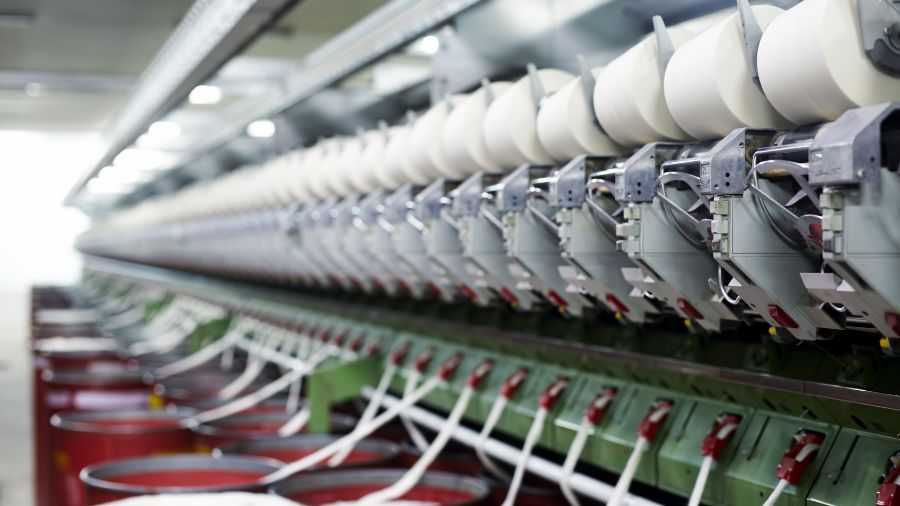Textile Spinning Machines Transforming the Fabric Industry's Core

In the world of textiles, the journey from raw material to finished product involves intricate processes, and at the heart of it all are textile spinning machines. These unsung heroes are responsible for transforming fibers into the essential yarns that serve as the foundation for the entire textile production process.
Textile spinning equipment forms the backbone of yarn production. These machines take raw fibers, often sourced from natural or synthetic materials, and convert them into continuous strands known as yarns. This meticulous conversion process involves drawing out the fibers, twisting them together, and winding them onto bobbins. The end result is a strong and uniform yarn that serves as a crucial building block for creating high-quality fabrics.
The spinning process is a remarkable feat of engineering that starts with preparing raw fibers. These fibers undergo cleaning, blending, and carding to create a consistent blend. The carded fibers are then stretched, twisted, and spun into yarns using various types of textile spinning machines. This process imparts strength to the yarn and determines its characteristics such as thickness and texture, leading to a wide variety of yarn types suitable for different textile applications.
Industrial spinning machines have revolutionized the textile industry by handling large volumes of fibers and producing yarns on an industrial scale. The efficiencyRead More : Unveiling the Remarkable Properties of Manmade Fibers and speed they offer have enabled manufacturers to meet the ever-growing demand for fabrics. These machines provide precision and consistency, contributing not only to increased productivity but also to the overall quality of textiles produced.
Continual innovation drives the evolution of yarn spinning machinery. Technological advancements have equipped modern spinning machines with features like automated controls, sensors, and monitoring systems. These innovations ensure consistent yarn quality, minimize waste, and reduce production costs. Moreover, sustainability is a key focus, leading to the development of eco-friendly spinning machines that consume fewer resources while producing less waste.
The textile industry's embrace of automation and technology is reshaping the spinning machine market. Manufacturers and businesses are seeking cutting-edge equipment to boost their production capabilities. There's a growing demand for specialized spinning machines designed for specific yarn types or production volumes. This trend has spurred extensive research and development, resulting in a diverse range of spinning machines tailored to meet various industry requirements.
The role of textile spinning machines in the fabric industry is pivotal. They form the cornerstone of yarn production, a crucial step that influences the final textile product's quality and characteristics. With the integration of technology and innovation, spinning machines are set to drive further advancements in the textile sector. As the industry strives for efficiency, sustainability, and specialized production, the evolution of spinning machines will undoubtedly play a crucial role in shaping the future of textiles.
Textile spinning machines are the unsung heroes of the fabric industry, transforming raw fibers into the essential yarns needed for textile production. With their contribution to large-scale production, yarn innovation, and adaptability to industry demands, these machines are propelling the textile sector forward, stitch by stitch.
Textile spinning equipment forms the backbone of yarn production. These machines take raw fibers, often sourced from natural or synthetic materials, and convert them into continuous strands known as yarns. This meticulous conversion process involves drawing out the fibers, twisting them together, and winding them onto bobbins. The end result is a strong and uniform yarn that serves as a crucial building block for creating high-quality fabrics.
The spinning process is a remarkable feat of engineering that starts with preparing raw fibers. These fibers undergo cleaning, blending, and carding to create a consistent blend. The carded fibers are then stretched, twisted, and spun into yarns using various types of textile spinning machines. This process imparts strength to the yarn and determines its characteristics such as thickness and texture, leading to a wide variety of yarn types suitable for different textile applications.
Industrial spinning machines have revolutionized the textile industry by handling large volumes of fibers and producing yarns on an industrial scale. The efficiency
Continual innovation drives the evolution of yarn spinning machinery. Technological advancements have equipped modern spinning machines with features like automated controls, sensors, and monitoring systems. These innovations ensure consistent yarn quality, minimize waste, and reduce production costs. Moreover, sustainability is a key focus, leading to the development of eco-friendly spinning machines that consume fewer resources while producing less waste.
The textile industry's embrace of automation and technology is reshaping the spinning machine market. Manufacturers and businesses are seeking cutting-edge equipment to boost their production capabilities. There's a growing demand for specialized spinning machines designed for specific yarn types or production volumes. This trend has spurred extensive research and development, resulting in a diverse range of spinning machines tailored to meet various industry requirements.
The role of textile spinning machines in the fabric industry is pivotal. They form the cornerstone of yarn production, a crucial step that influences the final textile product's quality and characteristics. With the integration of technology and innovation, spinning machines are set to drive further advancements in the textile sector. As the industry strives for efficiency, sustainability, and specialized production, the evolution of spinning machines will undoubtedly play a crucial role in shaping the future of textiles.
Textile spinning machines are the unsung heroes of the fabric industry, transforming raw fibers into the essential yarns needed for textile production. With their contribution to large-scale production, yarn innovation, and adaptability to industry demands, these machines are propelling the textile sector forward, stitch by stitch.
